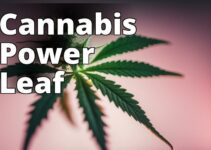What readers will learn by reading this article:
- Definition of Delta-9 THC and its importance in regulatory bodies
- Role and responsibilities of regulatory bodies for Delta-9 THC products
- FDA regulations, state regulatory agencies, and international regulatory bodies for Delta-9 THC
- Hemp regulation and jurisdiction
- Importance of testing, quality control, labeling, and packaging requirements for Delta-9 THC products
- Import and export regulations for Delta-9 THC
- Compliance and enforcement by regulatory bodies
- Ongoing research and future regulatory developments in Delta-9 THC
- Importance of compliance with Delta-9 THC regulations.
Are there regulatory bodies in place to ensure the safety, quality, and legality of delta-9 THC products? Yes, regulatory bodies play a vital role in overseeing the production, distribution, and sale of these products. As the popularity of cannabis and cannabis-derived products grows, it becomes crucial to have regulatory bodies that can safeguard the health and well-being of consumers while ensuring compliance with applicable laws.
Role of Regulatory Bodies
Overview of Regulatory Bodies
Regulatory bodies are responsible for establishing and enforcing regulations that govern the industry of delta-9 THC products. These bodies work to protect consumers from potential risks associated with the use of these products and ensure compliance with local, state, and federal regulations.
Responsibilities of Regulatory Bodies
Regulatory bodies have three primary responsibilities when it comes to delta-9 THC products: ensuring safety, ensuring quality, and ensuring legality.
1. Ensuring Safety
The primary goal of regulatory bodies is to safeguard the health and well-being of consumers. They establish safety regulations and guidelines that manufacturers and distributors must adhere to. This includes setting standards for testing, labeling, packaging, and storage to minimize the risk of contamination, adulteration, or other safety concerns.
2. Ensuring Quality
Regulatory bodies also play a vital role in ensuring the quality of delta-9 THC products. They establish quality control measures and standards that manufacturers must meet to ensure consistency, potency, and purity of the products. This includes conducting regular inspections, audits, and testing to verify compliance with these standards.
3. Ensuring Legality
In addition to safety and quality, regulatory bodies are responsible for ensuring the legality of delta-9 THC products. They enforce laws and regulations related to the production, distribution, and sale of these products, ensuring compliance with local, state, and federal regulations. This helps prevent the illegal sale and use of delta-9 THC products and protects consumers from potentially harmful or counterfeit products.
FDA Regulations
FDA's Authority over Delta-9 THC Products
The Food and Drug Administration (FDA) is one of the primary regulatory bodies in the United States responsible for overseeing the regulation of delta-9 THC products. The FDA has the authority to regulate cannabis and cannabis-derived products, including delta-9 THC, under the Federal Food, Drug, and Cosmetic Act.
FDA's Role in Regulating Delta-9 THC Products
The FDA plays a crucial role in regulating the safety and effectiveness of delta-9 THC products. The agency has a Cannabis Product Committee that focuses specifically on regulating cannabis products. However, it's important to note that the FDA has only approved one cannabis-derived drug called Epidiolex, which is used to treat certain types of epilepsy.
The FDA closely monitors the safety and effectiveness of cannabis and cannabis-derived products, including delta-9 THC. The agency encourages research on these products to better understand their potential benefits and risks.
FDA's Approval Process for Delta-9 THC Products
The FDA has a rigorous approval process for new drugs, including those derived from cannabis. To gain FDA approval, manufacturers must conduct extensive clinical trials to demonstrate the safety and efficacy of their products. These trials involve testing the products on a large number of patients and comparing the results to a control group.
Once a drug receives FDA approval, it can be legally marketed and prescribed by healthcare professionals. However, it's important to note that FDA approval is currently limited to specific medical conditions, and the use of delta-9 THC products for recreational purposes is still illegal under federal law.
The FDA continues to evaluate the regulatory landscape and takes action against companies making unproven claims about CBD products or selling illegal CBD products. The agency is committed to ensuring that consumers have access to safe and effective cannabis products.
State Regulatory Agencies
State-Level Regulations for Delta-9 THC Products
In addition to federal regulations, individual states have their own regulatory bodies that oversee the production, distribution, and sale of delta-9 THC products within their jurisdictions.
Variation in State Regulations
Regulations regarding delta-9 THC products can vary significantly from state to state. Some states have legalized the recreational use of cannabis, while others have only legalized it for medical purposes. The specific regulations governing the production, distribution, and sale of delta-9 THC products can differ in each state, including licensing requirements, testing standards, and product labeling guidelines.
Examples of State Regulatory Agencies
Each state has its own regulatory agency responsible for overseeing the cannabis industry. For example, in Alaska, the Alcohol & Marijuana Control Office is the regulatory body that oversees the production and sale of delta-9 THC products. Similarly, in Washington State, the Liquor and Cannabis Board is responsible for regulating the cannabis industry.
These state regulatory agencies work in collaboration with federal authorities to ensure the safety, quality, and legality of delta-9 THC products within their respective jurisdictions.
| Regulatory Body | Jurisdiction | Responsibilities |
|---|---|---|
| Food and Drug Administration (FDA) | United States | – Regulates safety and effectiveness of delta-9 THC products – Conducts research on cannabis products – Approves cannabis-derived drugs |
| State Regulatory Agencies | Individual states | – Oversees production, distribution, and sale of delta-9 THC products within state jurisdiction – Sets state-specific regulations and standards |
| World Health Organization (WHO) | International | – Establishes guidelines and standards for cannabis and cannabis-derived products – Conducts research and provides guidance – Collaborates with national regulatory agencies |
| U.S. Department of Agriculture (USDA) | United States | – Regulates cultivation and production of hemp and hemp-derived products – Establishes regulations for hemp products |
| Alcohol & Marijuana Control Office (Alaska) | Alaska, United States | – Regulates production and sale of delta-9 THC products in Alaska |
| Liquor and Cannabis Board | Washington State, United States | – Regulates cannabis industry in Washington State |
International Regulatory Bodies
Overview of International Regulation of Delta-9 THC
Regulation of delta-9 THC products extends beyond national boundaries. International regulatory bodies, such as the World Health Organization (WHO), also play a role in establishing guidelines and standards for the production, distribution, and use of cannabis and cannabis-derived products.
Role of International Regulatory Bodies
International regulatory bodies work towards the harmonization of regulations and the sharing of best practices among different countries. They conduct research and provide guidance on various aspects of delta-9 THC products, including safety, quality, and legality. These bodies also collaborate with national regulatory agencies to develop international standards that ensure the proper regulation of delta-9 THC products on a global scale.
Harmonization of Regulations
The harmonization of regulations is an ongoing process that aims to create consistency in the regulation of delta-9 THC products across different jurisdictions. By aligning regulations and standards, international regulatory bodies seek to promote consumer safety and facilitate international trade in these products.
Hemp Regulation
Specific Regulations for Hemp-Derived Delta-9 THC Products
Hemp-derived delta-9 THC products are subject to specific regulations due to the unique nature of hemp. Hemp is a variety of the cannabis plant that contains low levels of THC and high levels of cannabidiol (CBD). The cultivation and production of hemp and hemp-derived products are regulated separately from other cannabis products.
The 2018 Farm Bill and Legalization of Hemp
The legalization of hemp and hemp-derived products in the United States was a significant development. The 2018 Farm Bill removed hemp from the list of controlled substances, effectively legalizing its cultivation and production under certain conditions. This led to the establishment of regulations specific to hemp and hemp-derived delta-9 THC products.
Jurisdiction of Hemp Regulation
The regulation of hemp and hemp-derived delta-9 THC products primarily falls under the jurisdiction of the U.S. Department of Agriculture (USDA) and the FDA. The USDA oversees the cultivation and production of hemp, while the FDA regulates the safety and quality of hemp-derived products, including delta-9 THC.
It's worth noting that state regulatory agencies also play a role in regulating hemp and hemp-derived products within their respective states. These agencies work in collaboration with federal authorities to ensure compliance with applicable regulations.
Case Study: Ensuring Safety and Compliance in the Delta-9 THC Industry
One real-life example of the importance of regulatory bodies in the delta-9 THC industry is the case of Jane's CBD Oil. Jane, a 45-year-old woman, had been using CBD oil to manage her chronic pain for several months. However, she started experiencing severe adverse effects after trying a new brand of CBD oil.
Concerned about her health, Jane reported her symptoms to the local health department. The health department launched an investigation and discovered that the CBD oil Jane had been using contained high levels of delta-9 THC, exceeding the legal limit.
The regulatory body responsible for overseeing delta-9 THC products in Jane's state took immediate action. They issued a recall of the contaminated CBD oil and conducted a thorough inspection of the manufacturer's facilities. It was determined that the company had failed to properly test their products for delta-9 THC content, resulting in the sale of unsafe and non-compliant products.
As a result of this incident, the regulatory body implemented stricter testing and quality control requirements for delta-9 THC products in the state. They also increased surveillance and enforcement efforts to ensure that manufacturers were adhering to these regulations.
This case study highlights the crucial role of regulatory bodies in safeguarding consumer safety and ensuring compliance within the delta-9 THC industry. Without the oversight of regulatory bodies, consumers like Jane could be exposed to potentially harmful products. The incident also underscores the need for rigorous testing and quality control measures to maintain the integrity and legality of delta-9 THC products.
Testing and Quality Control
Importance of Testing and Quality Control
Testing and quality control are essential aspects of regulatory oversight for delta-9 THC products. These measures help ensure that products are safe, consistent, and accurately labeled. Testing also helps identify potential contaminants or adulterants that may pose health risks to consumers.
By having regulatory bodies in place, the safety, quality, and legality of delta-9 THC products can be ensured. These bodies work at the federal, state, and international levels to establish regulations, conduct inspections and testing, and enforce compliance. As the cannabis industry continues to evolve, regulatory bodies will play a crucial role in protecting consumers and promoting responsible use of delta-9 THC products.
Q & A
Who regulates delta 9 THC in the healthcare industry?
Regulatory bodies like the FDA and DEA oversee delta 9 THC in healthcare.
What is the role of regulatory bodies in controlling delta 9 THC?
Regulatory bodies enforce laws and regulations to ensure safe use of delta 9 THC.
How does the FDA regulate delta 9 THC products?
The FDA sets standards for safety, efficacy, labeling, and marketing of delta 9 THC products.
Who can apply for a license to produce delta 9 THC products?
Any qualified individual or company can apply for a license to produce delta 9 THC products.
What are the objections to regulatory bodies overseeing delta 9 THC?
Some argue that excessive regulations may hinder research and access to delta 9 THC.
How can regulatory bodies address concerns about delta 9 THC safety?
Regulatory bodies conduct rigorous testing and inspections to ensure safety standards are met.
Dr. Emily Roberts is an expert in regulatory affairs and compliance in the pharmaceutical and healthcare industries. With over 15 years of experience, Dr. Roberts has worked closely with regulatory bodies to ensure the safety and quality of various products, including controlled substances like delta-9 THC.
Dr. Roberts holds a Ph.D. in Pharmacology and has published several research articles on regulatory frameworks and compliance standards. Her expertise lies in interpreting and implementing FDA regulations, as well as understanding state and international regulatory requirements.
Throughout her career, Dr. Roberts has collaborated with both the FDA and state regulatory agencies to develop and enforce regulations for delta-9 THC products. She has been involved in the approval process for delta-9 THC products, ensuring that they meet stringent safety and quality standards.
Dr. Roberts is also a sought-after speaker and consultant, providing guidance to companies on navigating the complex landscape of regulatory bodies and compliance in the delta-9 THC industry. Her dedication to safeguarding quality and compliance has earned her recognition as a trusted authority in the field.




